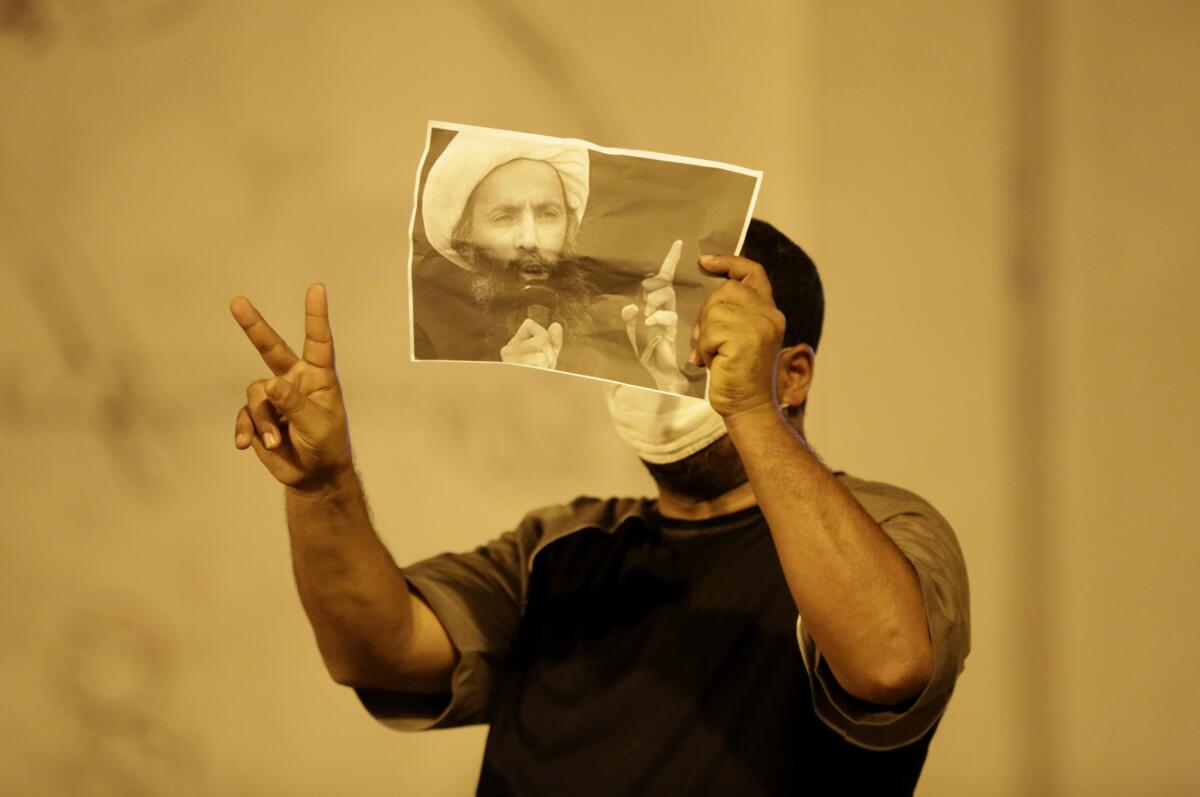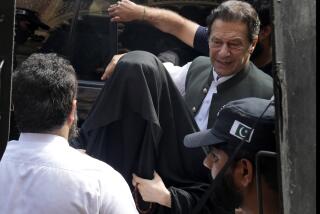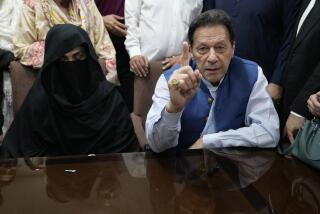Iranian ayatollah, diplomat condemn Saudi Arabian cleric’s conviction

- Share via
Reporting from Tehran, Iran — A well-known Iranian ayatollah and a top diplomat in Tehran have joined in widespread condemnation of a death sentence handed down in Saudi Arabia against Sheikh Nimr Baqir al Nimr, a prominent Shiite Muslim cleric and dissident.
“If Sheikh Nimr is executed, Saudi Arabia should be ready for dire consequences and will pay a heavy price,” Ayatollah Ahmad Khatami said during his weekly Friday address in Tehran.
A day earlier, Iranian Deputy Foreign Minister Hossein Amir Abdollahian said measures such as the death sentence “do not contribute to the restoration of peace and calm in the region.”
The issue appears to have elevated tension between a pair of regional rivals — Iran, where the population is mostly Shiite Muslim, and Saudi Arabia, a predominantly Sunni Muslim nation.
Nimr, who participated in anti-government protests in Saudi Arabia in 2011, was convicted Wednesday in a Saudi court of “breaking allegiance with the ruler,” “inciting sectarian strife” and “encouraging, leading and participating in demonstrations.”
Prosecutors had demanded the maximum penalty — death by crucifixion followed by beheading. The court, however, handed down a “discretionary” death sentence that could be commuted by appeal — a likely scenario that observers argue would serve as a warning to the country’s Shiite population.
Protests against the verdict erupted in parts of Saudi Arabia as well as in neighboring Bahrain. Shiites in both Sunni Muslim-led Gulf kingdoms have demonstrated against what they view as second-class treatment.
Activists uploaded pictures and videos depicting hundreds of protesters marching for the third consecutive day in the streets of Nimr’s hometown of Qatif, and social media outlets were flooded with messages of support for him.
Nimr is an outspoken critic of what he calls the anti-Shiite policies of the Saudi kingdom, but he has advocated peaceful resistance. In 2012, Nimr was shot multiple times and arrested by police, triggering a wave of protests in Qatif that left three Shiites dead. Nimr’s nephew was also arrested and sentenced to death, although the punishment has yet to be carried out.
Shiite Muslims constitute 10% to 15% of Saudi Arabia’s population, concentrated mostly in its oil-rich Eastern province. They have long fought against what they say is systematic discrimination that limits Shiite access to public education, government employment and other opportunities and benefits.
The kingdom’s Shiite minority also seeks a greater say in the affairs of a country that promotes itself as the global religious and political leader of Sunni Muslims.
International rights groups criticized the verdict, which, according to Joe Stork, deputy Middle East director at Human Right Watch, would only add “to the existing sectarian discord and unrest” in the kingdom.
“Saudi Arabia’s path to stability in the eastern province lies in ending systematic discrimination against Shia citizens, not in death sentences,” Stork said in a statement.
Said Boumedouha, Amnesty International’s deputy director in the Middle East and North Africa, said the verdict “illustrate[s] the lengths Saudi Arabia will go to in their quest to stop Shia activists from defending their rights.”
In Iran, the sentence is seen as signaling the latest reversal of diplomatic efforts to ease tensions between the two countries, which have faced off via proxy forces across the Middle East, notably in Syria. Iran is a major backer of the government of Syrian President Bashar Assad, and Saudi Arabia has aided rebel groups fighting for Assad’s ouster from power.
On Monday, Saudi Foreign Minister Prince Saud al Faisal lashed out at Iran, describing it as “part of the problem” in regional conflicts. His comments triggered an angry reaction in Tehran.
Special correspondent Mostaghim reported from Tehran and special correspondent Bulos from Gaziantep, Turkey. Times staff writer Patrick J. McDonnell in Gaziantep contributed to this report.
More to Read
Sign up for Essential California
The most important California stories and recommendations in your inbox every morning.
You may occasionally receive promotional content from the Los Angeles Times.











